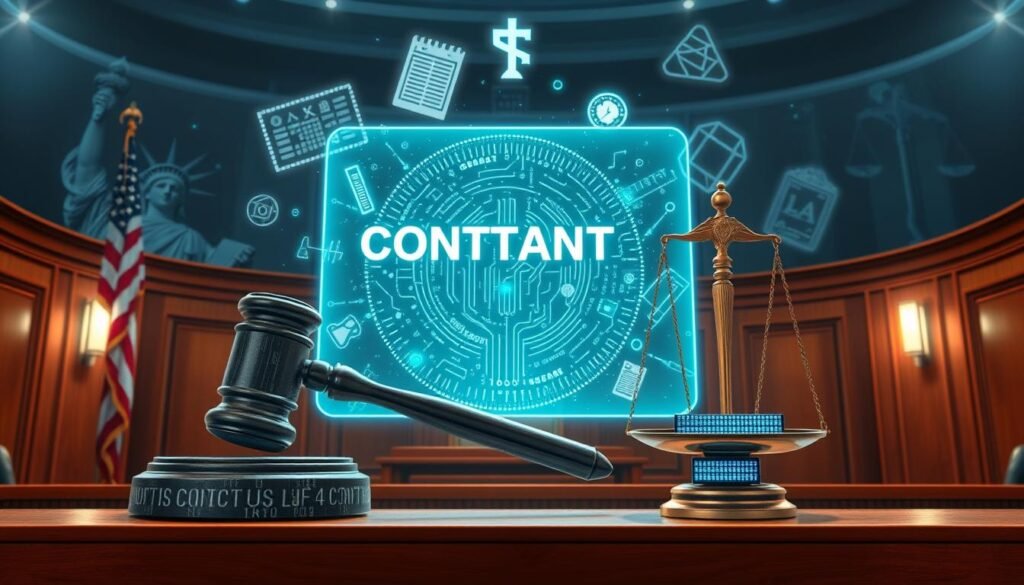Have you ever thought about how a simple line of code could change everything? Smart contracts are self-executing agreements that use blockchain technology. They’re not just a new tech; they’re changing how we do business, making things more efficient and secure.
These digital agreements bring a new level of trust. They cut out the middlemen and make things run smoother. As more people start using smart contracts, we’re seeing a big change. It’s shaking up old ways of doing things.
Key Takeaways
- Smart contracts automate tracking and payment processes in supply chain management, enhancing operational efficiency1.
- These contracts use programming languages like Solidity for Ethereum, showing their advanced tech reliance1.
- In real estate, smart contracts make sure ownership changes when payment is made, showing their real-world use1.
- Insurance claims can be handled right away if certain conditions are met, highlighting smart contracts’ speed and reliability1.
- With ongoing work on making them better and working together, smart contracts’ future looks bright2.
Introduction to Smart Contracts
Smart contracts are changing how we make deals in the digital world. They work on their own, without needing people to do the work. This makes things faster and safer, which is great for businesses today.
These contracts live on blockchain platforms and use special rules to act on their own. They cut down on mistakes and make sure everything is clear and can’t be changed. This is why they’re key for making deals online3. For example, the Ethereum blockchain shows how smart contracts can work in real life3.
The idea of smart contracts was first talked about by Nick Szabo. It combines legal agreements with computer code. Experts like Stuart D. Levi and Alex B. Lipton say they’re safe and reliable, making tasks like money transfers easy4. Companies are using them to make their work flow better, saving time and money4.
Smart contracts make deals smoother in many areas, making things more accountable and less likely to cause trouble. For instance, The Home Depot uses them to talk better with vendors. This helps improve relationships and encourages new ideas5. As more businesses use these digital tools, we’re moving towards a future where making deals will be easier and more automated.
Understanding How Smart Contracts Work
Smart contracts are a new way to make agreements work without people. They use code to carry out deals based on set rules. First, people agree on terms, then a six-step process follows before it’s recorded on the blockchain6.
Self-Executing Agreements
Smart contracts make deals happen between two parties on their own. They don’t need a third person, using code to manage things. This makes transactions faster and more accurate7.
When the rules are met, the contract acts on its own. This means quick results and a permanent record on the blockchain for everyone to see6. It also saves money by removing middlemen like banks and lawyers8.
Role of Blockchain Technology
Blockchain is key to smart contracts working. It offers a safe and open space for all to trust in transactions8. Everyone can check the deals themselves, making cheating rare6.
The safety of smart contracts comes from careful coding and checks. This makes sure they work right and don’t have hidden problems7. Smart contracts are changing many fields, like finance and healthcare, showing their big impact7.
Benefits of Smart Contracts
Smart contracts are a big step forward in managing agreements. They bring many benefits to different areas. They offer transparency, letting everyone check terms and follow rules in real-time. This means no need for middlemen, making transactions smoother.
Enhanced Trust through Transparency
Smart contracts are open because of blockchain’s public ledger. This lets everyone see if rules are followed without needing outside checks. It’s key for trust, as all actions are clear and can’t be changed. This is especially important in places like finance and healthcare.
Cost-Effectiveness by Reducing Intermediaries
Smart contracts cut down on costs of managing contracts. They automate tasks and cut out middlemen, saving on legal and admin costs. This makes them cost-effective. They can handle complex tasks like real estate or supply chain management, making things run smoother and faster9.
Speed and Efficiency in Execution
Smart contracts are fast, executing agreements quickly once conditions are met. This speed saves time and ensures agreements are met on time. The Ethereum blockchain shows this, with about 44 million smart contracts by August 202210.
Applications of Smart Contracts Across Industries
Smart contracts are changing many fields, showing their wide use and efficiency. They help a lot in the financial world by making complex deals easier and safer. This is why the smart contract market is expected to hit 2.5 billion USD by 203211.
Transforming the Financial Sector
In finance, smart contracts are mainly used in Banking, Finance, and Insurance (BFSI). They make things run smoother and speed up claims, leading to lower premiums and less cost for insurers12. Companies using them can also save a lot on reporting and audits thanks to clear financial data.
Real Estate Transactions Automation
Smart contracts are also making a big difference in real estate. They make buying and selling properties faster and cheaper. This digitizes property records, making the real estate business more efficient12.
Streamlining Supply Chain Management
Smart contracts make supply chains better by automating orders, payments, and tracking. Walmart and The Home Depot have seen a big drop in costs, almost 45%11. They help build stronger relationships with vendors and cut down on disagreements, making the supply chain clearer.
Smart Contracts in the Healthcare Sector
Smart contracts are changing healthcare in big ways. They help manage medical data and protect patient privacy. The global market for healthcare smart contracts was worth USD 1.6 billion in 2021. It’s expected to grow at a rate of 20.5% each year until 203013.
These contracts make billing, scheduling, and claims handling automatic. This cuts down on work for healthcare providers and improves care for patients13.
Smart contracts also make it safe to share patient data. They use blockchain to keep information private. This way, patient secrets stay safe during transactions14.
They also help manage patient consent in clinical trials. This makes sure everything is done right and openly14.
In the world of prescription drugs, smart contracts track authenticity. This makes sure drugs are real and safe. In 2021, over 33.0% of the market was for drug and medical device companies. This shows how much smart contracts are valued for safety13.
| Application | Description | Benefit |
|---|---|---|
| Claims Processing | Automates the reimbursement process in health insurance. | Reduces administrative burden and accelerates payments14. |
| Clinical Trials | Improves consent management and regulatory compliance. | Enhances transparency and operational efficiency14. |
| Telemedicine | Facilitates billing and payments for remote services. | Automates processes for accurate compensation14. |
| Supply Chain Management | Ensures drug authenticity and enhances patient safety. | Improves tracking throughout the supply chain14. |
Legal Validity of Smart Contracts in the United States
The legal scene for smart contracts in the U.S. has changed a lot. Laws like the Uniform Electronic Transactions Act (UETA) and the E-Sign Act help. They make sure electronic signatures and records are legal, making smart contracts binding. Even though there’s no federal law on smart contracts, the E-Sign Act gives them strong legal backing15.
UETA and E-Sign Act Overview
UETA has been adopted by 47 states. It says electronic records and signatures are legally valid. This helps make smart contracts more accepted and enforceable in court. The E-Sign Act, passed in 2000, adds to this, making electronic transactions, including smart contracts, legally enforceable15.
State-Level Legal Adaptations
States are making their laws fit for smart contracts and blockchain. Arizona approved smart contracts in April 2017, seeing them as programs on a blockchain. Nevada and Vermont also passed laws that recognize blockchain data, making smart contracts legal in their areas15. These changes show states are keeping up with new tech, supporting innovation.

Challenges and Limitations of Smart Contracts
Smart contracts have a lot of promise, but they face many challenges. It’s important for those working on them to understand these issues.
Technical Complexity
The technical complexity of smart contracts is a big problem. They need perfect coding to avoid financial losses or security issues16. Most developers find it hard to work with these contracts because of their unique programming languages17.
This makes it hard for more people to use them. Also, there’s no standard way to make smart contracts work together, which makes things even harder16.
Regulatory Compliance Issues
Getting smart contracts to follow the law is a big challenge. The rules are unclear, especially in areas like finance and healthcare16. This makes it hard to know if smart contracts are legal in different places17.
Security Risks and Vulnerabilities
Smart contracts can be risky because they can’t be changed once they’re set up16. They also rely on outside data, which can be corrupted17. This can make the contracts not work right.
Big mistakes in smart contracts can cause a lot of money to be lost. For example, DeFi hacks have cost over $361 million recently17.
| Challenge | Description | Impact |
|---|---|---|
| Technical Complexity | Need for error-free coding; use of esoteric programming languages. | Inaccessible to many developers, leading to potential errors. |
| Regulatory Compliance | Ambiguity in legal frameworks across jurisdictions. | Impedes adoption, especially in regulated sectors. |
| Security Vulnerabilities | Use of oracles and reliance on external data. | Higher risk of corruption and financial loss. |
Fixing these challenges of smart contracts is key to making them better. We need to make sure they are secure, work well, and follow the law1617.
Future of Smart Contracts
Smart contracts are set to see big changes soon, thanks to new tech and more use in different fields. They’re becoming key in digital agreements, especially with decentralized finance (DeFi). This makes deals faster and safer. In 2023, the smart contracts market is worth USD 1.71 billion. It’s expected to grow to USD 12.55 billion by 2032, with a growth rate of 24.7%18.
This growth shows more people see the value of smart contracts. They’re being used in areas like real estate, healthcare, and banking.
Emerging Trends in Digital Agreements
New trends include using AI and machine learning to make smart contracts better. This means they can handle complex deals more easily. It also means fewer errors and faster transactions19.
Smart contracts are making a big difference in sectors like utilities and real estate. They help make things more accurate and efficient19. They’re also being used with the Internet of Things (IoT) to manage things in real-time. This shows a trend towards using smart contracts for better automation and efficiency20.
Integration with Decentralized Finance (DeFi)
There’s a growing interest in using smart contracts with DeFi. This is good news for the financial world. As more industries use blockchain, smart contracts play a key role in making transactions clear and self-running. This is what DeFi needs to thrive18.
Smart contracts are leading the way in new financial solutions. They help speed up insurance claims, make identity checks easier, and protect ideas better18. As rules get better, smart contracts will work better across different platforms. This will help them work together better20.
How Smart Contracts Enhance Legal Agreements
Smart contracts are changing how we make legal agreements. They use new technology to make sure everyone does their part without needing middlemen. This makes things faster and more efficient.
Automated Execution Processes
Smart contracts only work when certain things happen first. This makes sure agreements are followed exactly. It also cuts down on mistakes, building trust among everyone involved.
The banking, insurance, and real estate sectors will see big gains from smart contracts. They can handle things like settling claims and updating public records21.
Increased Transparency and Trust
Smart contracts make everything clear because all transactions are on a blockchain. This means anyone can check the details themselves. It builds trust, which is key in legal agreements.
Craig Rogers from Eversheds Sutherland says smart contracts fit right in with old legal rules. They’re seen as valid in many areas21. Plus, they have all the usual parts of a contract, making them legally strong22.
Cost Efficiency in Legal Processes
Smart contracts can save a lot of money in legal work. They cut down on paperwork and get rid of middlemen. This means businesses can save a lot.
The market for smart contracts is growing fast, expected to hit $345 million by 202722. But, companies also face challenges like setting them up and making them easy to use23.

Innovations in Smart Contracts: A Case Study
Smart contracts are changing many industries by offering new solutions and making things more efficient. For example, JP Morgan’s Quorum has made cross-border payments safer and faster, cutting down on costs24. Santander’s One Pay FX also uses smart contracts for quicker and cheaper international payments, making customers happier and more trusting24.
In real estate, smart contracts are making a big difference. Propy’s platform has cut costs and time by removing middlemen, making buying and selling easier24. Dubai’s blockchain system for real estate has also improved by using smart contracts for property transfers24.
IBM Food Trust has improved food safety by tracking the food supply chain, making it more transparent and traceable24. Walmart has used smart contracts to track food products, reducing the risk of foodborne illnesses24. In healthcare, Chronicled’s blockchain platform has made supply chains more secure by automating and verifying product authenticity24.
Smart contracts are also making digital agreements more efficient. OpenLaw’s self-executing contracts automate legal agreements, making the legal field more efficient24. The Accord Project has standardized digital agreements using blockchain, making contract management faster and cheaper24.
Smart contracts are being used in many areas, like AXA’s Fizzy for automatic flight delay compensation and Etherisc’s crop insurance for farmers24 and25. The energy sector has also seen changes, with Power Ledger enabling peer-to-peer energy trading24.
Even though smart contracts are promising, their adoption is still in its early stages, according to a Gartner report26. They are different from traditional automation because they are transparent, unchangeable, and work without middlemen26. This opens up many possibilities, from tracking products in supply chains to ensuring rules are followed in different industries26.
Platforms like Accenture Blockchain for Contracts make processes smoother by allowing contracts to be proposed, changed, and executed securely25. These technologies also ensure high security through encryption and promote full transparency25. As companies move their contracts to the blockchain, they see better speed, efficiency, and accuracy, and less environmental harm25.
Looking at these examples shows how smart contracts can change things, but also highlights the challenges and successes they bring.
Conclusion
Smart contracts are changing how we make digital agreements. They make transactions more transparent, secure, and fast. This technology is now used by businesses to improve their operations.
These contracts can save costs and build trust among parties. They automate transactions, reducing the need for middlemen.
The future of smart contracts looks bright. They will change many sectors, including finance and law. They can work on platforms like Ethereum and are becoming more accepted worldwide2728.
As more companies use smart contracts, transactions will get better. This will start a new chapter in managing contracts. But, there are still challenges like needing more technical skills and following legal rules29.















